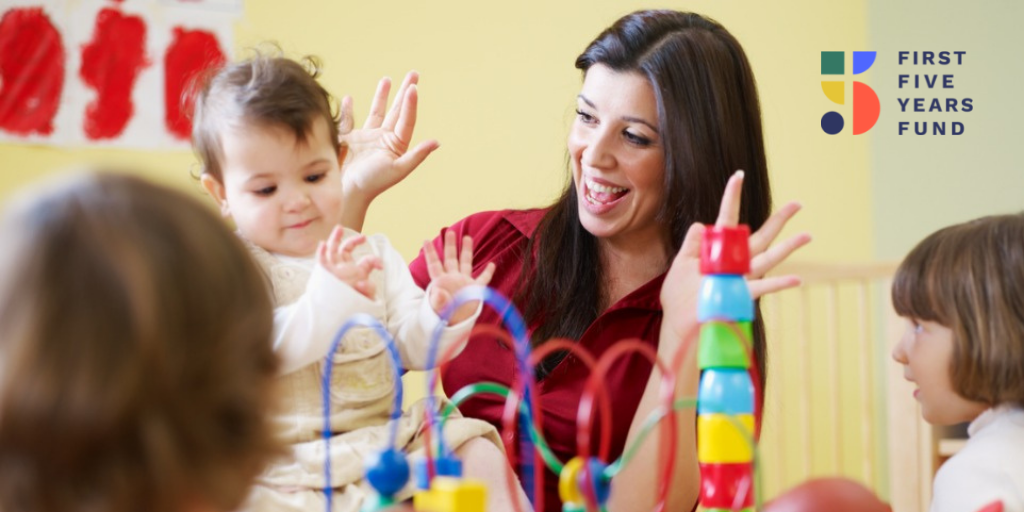Learning from Experts: How EHS-CCPs Are Benefitting Children and Families in Grantee States

Last week, the Bipartisan Policy Center (BPC), in partnership with the Children’s Equity Project and Start Early, wrapped up their 3 part webinar series on Early Head Start- Child Care Partnership (EHS-CCP) grants. EHS-CCPs build on the existing strengths of Early Head Start and Child Care and Development Fund (CCDF) subsidies, which allow low-income families to access high-quality child care. Through grantee partnerships with an array of local child care providers, EHS-CCP maximizes the impact of federal grant and subsidy dollars to expand access to high-quality child care and comprehensive supports for infants and toddlers from low-income families.
The 3 part series dove deeper into the recently published set of briefs: “Building Supply, Enhancing Quality, and Advancing Equity: The Early Head Start-Child Care Partnership Series”. Throughout the webinars, state leaders shared how local communities have used EHS-CCP to support young children and their families to access high-quality care. These critical discussions emphasize the beneficial impact of EHS-CCP and the necessity for increased federal funding to expand the program’s impact. You can find a high-level overview of the webinar discussions below.
Webinar 1 explored what the partnerships are, how they came to be, and actionable policy recommendations across all levels of government to establish and grow EHS-CCPs. In this webinar, Linda Smith, Director of Early Childhood Development at BPC highlighted the many benefits of EHS-CCPs, particularly emphasizing that they have a “ripple effect,” where all children in a classroom or program, beyond those directly enrolled, benefit. Furthermore, the ability to pivot to use funds to serve families in ways that best support them is extremely valuable, and many grantees mention using mental health supports and bonuses for teachers and staff during the pandemic.
Webinar 2 took a deep dive into how states can build EHS-CCP and align state systems with the holistic Head Start model. EHS-CCP officials in California, Georgia, and Alabama shared their successes and lessons learned.
- Barbara Cooper, the previous Secretary of the Department of Early Education in Alabama, shared that there have been big successes in terms of continuous quality improvements, including through Alabama’s coaching model. Alabama has a Child Development Associate (CDA) credential tracker to understand where teachers currently are in the process and provide individualized support as teachers move through their CDA, as well as help address mental health concerns by working directly with teams of teachers. Additionally, EHS-CCP has helped to reach many children and families in rural communities in Alabama.
- Sarah Neville-Morgan of the California Department of Education shared that the partnerships provided opportunities to serve families who otherwise would not have had access to high–quality supports. In California, EHS-CCP has helped both centers and family child care programs be ready to participate in Quality Counts California (QCC) and be prepared for higher levels of assessment.
- Bentley Ponder from the Division of Early Care and Learning in Georgia, said one major benefit of being an EHS-CCP grantee is that the department is working more directly with local EHS-CCP, Head Start, and Early Head Start grantees. He emphasized that having staff on the ground providing those direct services, working directly with families and teachers gives the department great insight into not only what is going on in programs, but also the quickly shifting child care and early learning needs in the state at large. He concluded by emphasizing how aligning Early Head Start to work with the state’s subsidy program and pre-K program has been a big strength in Georgia.
Webinar 3 highlighted examples from the field and emphasized how the partnerships have contributed to stabilizing child care partners during the pandemic, expanding access to mental health and other comprehensive services for children and families, and strengthening workforce development and retention. As evidenced in the Children’s Equity Project report, “Spotlight on EHS-CCP Grantees During the Pandemic”, below are a couple of ways EHS-CCP have provided support to child care providers during a particularly challenging time.
Pandemic Response and Recovery
- Provided a stable source of funding and enabled providers to keep doors open
- Improved facilities to meet health guidelines for physical distancing, improved airflow and access to air filtration, disinfecting supplies etc.
- Assisted providers in accessing relief funds
- Created care packages for families (formula, baby food, PPE, disinfectant, clothing)
- Leveraged health and mental health staff to address public health guidance and PD for staff
- Provided up-to-date health and safety guidance in line with public health officials
Expanded Access to Comprehensive Services
- Prioritized access to mental health consultants for staff and families
- Offered professional development to improve staff well-being
- Connected staff and parents with health and mental health community resources based on individualized needs and built networks of collaborative parent support
- Resourced family child care grantees with the materials and services needed to continue to operate
Supporting the Workforce
- Compensated staff for professional development time and addressed participation barriers
- Increased mental health support
- Improved workforce compensation, benefits, and professional pathways
Even though EHS-CCPs are providing valuable benefits to young children and families across the nation, the program only reaches a fraction of those who could benefit. States have effectively leveraged this model to provide comprehensive early learning and family supports, and, equipped with years of impact and lessons learned, know they can do so much more with additional funding. Expanded federal funding is essential so more children and families can benefit from this program.
Subscribe to FFYF First Look
Every morning, FFYF reports on the latest child care & early learning news from across the country. Subscribe and take 5 minutes to know what's happening in early childhood education.


